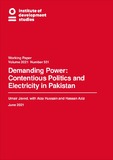Demanding Power: Contentious Politics and Electricity in Pakistan
| dc.contributor.author | Javed, Umair | |
| dc.contributor.author | Hussain, Aiza | |
| dc.contributor.author | Aziz, Hassan | |
| dc.coverage.spatial | Pakistan | en |
| dc.date.accessioned | 2021-06-03T16:11:51Z | |
| dc.date.available | 2021-06-03T16:11:51Z | |
| dc.date.issued | 2021-06-03 | |
| dc.identifier.citation | Javed, U., with Hussain, A. and Aziz, H. (2021) Demanding Power: Contentious Politics and Electricity in Pakistan, IDS Working Paper 551, Brighton: Institute of Development Studies, DOI: 10.19088/IDS.2021.047 | en |
| dc.identifier.isbn | 978-1-78118-808-8 | |
| dc.identifier.issn | 2040-0209 | |
| dc.identifier.uri | https://opendocs.ids.ac.uk/opendocs/handle/20.500.12413/16638 | |
| dc.description.abstract | This paper explores Pakistan’s electricity supply crisis that lasted from 2007 to 2015, and the ensuing contention that shaped public discourse and political events in the country. During this period, which witnessed electricity outages of up to 14 hours per day, 456 incidents of contention took place, with just under 20 per cent escalating into some form of violence. Electricity became the number one political issue in the country and was integral in shaping the outcomes of the 2013 General Election. Following the election, public authorities undertook extensive investment to expand capacity and ensure consistency in supply while evading questions about affordability and sustainability. On the surface, this appears to be a case of extensive protest working towards shaping state responsiveness. And it is true that the state now sees supply as a non-negotiable aspect in the social contract with citizens. However, a range of factors contributed to the chronology and the selective, generation-focused nature of this response. On the other hand, citizen inclusion and participation in decision-making, and issues of affordability and sustainability, which impact vulnerable and disempowered groups the most, remain absent from the political and policy conversation around energy. This suggests that while protests were useful in generating a short-term response, their long-term legacy in empowerment related outcomes is less visible. | en |
| dc.description.sponsorship | Foreign, Commonwealth & Development Office | en |
| dc.language.iso | en | en |
| dc.publisher | Institute of Development Studies | en |
| dc.relation.ispartofseries | IDS Working Paper;551 | |
| dc.rights | This is an Open Access paper distributed under the terms of the Creative Commons Attribution 4.0 International licence (CC BY), which permits unrestricted use, distribution, and reproduction in any medium, provided the original authors and source are credited and any modifications or adaptations are indicated. | en |
| dc.rights.uri | http://creativecommons.org/licenses/by/4.0/ | en |
| dc.subject | Industrial Development | en |
| dc.subject | Politics and Power | en |
| dc.subject | Rights | en |
| dc.subject | Security and Conflict | en |
| dc.title | Demanding Power: Contentious Politics and Electricity in Pakistan | en |
| dc.type | IDS Working Paper | en |
| dc.rights.holder | Institute of Development Studies | en |
| dc.identifier.team | Power and Popular Politics | en |
| dc.identifier.doi | 10.19088/IDS.2021.047 | |
| rioxxterms.funder | Default funder | en |
| rioxxterms.identifier.project | Default project | en |
| rioxxterms.version | VoR | en |
| rioxxterms.versionofrecord | 10.19088/IDS.2021.047 | en |
| rioxxterms.funder.project | 9ce4e4dc-26e9-4d78-96e9-15e4dcac0642 | en |
Files in this item
This item appears in the following Collection(s)
Except where otherwise noted, this item's license is described as This is an Open Access paper distributed under the terms of the Creative Commons Attribution 4.0 International licence (CC BY), which permits unrestricted use, distribution, and reproduction in any medium, provided the original authors and source are credited and any modifications or adaptations are indicated.


